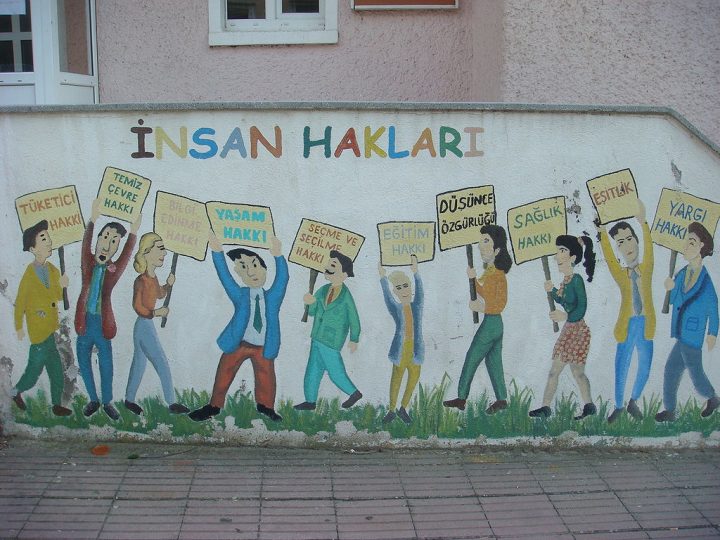By Ercan Jan Aktaş
In 1989, for the first time in Turkey, Tayfun Gönül and Vedat Zencir announced their conscientious objection through a campaign conducted by Sokak Magazine. Both were charged with the offense of “alienating people from military service” governed by the Article 318/1 of the Turkish Penal Code (TCK).
In 1992, with the establishment of the Anti-War Association in Izmir, the conscientious objection movement gained momentum. However, new cases have started to be brought against conscientious objectors.
The president of Anti-War Association Osman Murat Ülke who declared the organization’s conscientious objection in 1995 was arrested on 7 November 1996 according to Article 155 of the Turkish Penal Code (TCK). Ülke was tried 8 times in a court on charges of “disobeying orders” and so, stayed 701 days in prison.
In 2006, The European Court of Human Rights condemned Turkey in the case of Ülke’s trial and their punishment considering the European Convention on Human Rights (ECHR) under Article 3 of the “prohibition of torture”. During this process, a military law amendment arose with the regulation “not to defend the idea of conscientious objection, but to declare oneself as a conscientious objector” is a crime. Thus, conscientious objectors began to be protected from Article 115.
Mehmet Bal, who declared his conscientious objection on October 18, 2002 while doing military service, was imprisoned for 17 months in 2003/2004 due to same Article 155 of the Turkish Penal Code. In 2001, Mehmet Tarhan declared his own conscientious objection. Tarhan was detained and arrested on April 8, 2005 and subjected to severe torture as a result of being both “traitor” and “rotten” homosexual.
Mehmet Tarhan was taken to the disciplinary ward called “DISKO” (disco) in Sivas Military Prison. In here, his hair was forcibly cut. He was repeatedly beaten and his lynching was attempted. Tarhan tried to protect himself from these pressures by going on hunger strike. Tarhan did not accept the “rotten report” that was asked to be given because of his sexual orientation. they were gay. He refused the report by saying “I regard this report as self-rot of the military order”.
After Mehmet Tarhan, İnan Süver was arrested.
Towards the end of the 2000s, with the socialization of conscientious objection, Enver Aydemir and Serdar Delice declared their conscientious objection. They were the first in Turkey to declare their conscientious objection due to religious belief. They refused to serve in a “secular” army. Both were tried in military courts and kept in prisons.
Yunus Erçep, Barış Görmez Ilke, Fethi Demirtas from the Jehovah’s Witnesses who refused to be armed in following their faith teachings of the Prophet Jesus, whose teachings are against violence. They were tried in a court and stayed in military prisons.
Lawsuits were filed in 2016 against conscientious objector Ercan Jan Aktaş, Meral Geylani and Yannis Vasilis Yaylalı under the Article 301 Suç Crimes against the Signs of Sovereignty of the State and the Reputation of State Organs” and Article 318 “Alienating People From Military Service” are ongoing.
The severe experiences faced by conscientious objectors can be defined as “civil death” which was also stated by ECHR in the case of Osman Murat Ülke. Conscientious objectors do not have the freedom to move without restriction. They cannot work in social security/government or socially secured jobs. Conscientious objectors cannot live openly and freely in secure residence, cannot work in any public job desired and finally cannot attend university after a certain age. They are sentenced to a difficult life on their own far from the assurance of economic and social life.
Especially in recent years, high fines have been imposed on conscientious objectors. By not paying these fines, their bank accounts were confiscated and blocked. Following this context, in 2008, the bank accounts of Yavuz Atan and in 2009 Burak Özgüner and Şendoğan Yazıcı’s accounts were blocked.
The case opened for Şendoğan Yazıcı under Article 53/1 of the Turkish Penal Code points to a new situation. His trial for this article continues. In case of his being sentenced from this article, possible results may be:
- Banning from public office and civil service
- Banning from the right to vote and to be elected
- Restraint of custody and guardianship rights.
- Banning from being a supporter, member or administrator of foundation, association or political party
- Not being able to perform the profession and art subjected to the permission of a professional organization.
In this way, the “civil death” that conscientious objectors in Turkey experienced is combined with “legal death”. Thus, all living spaces of conscientious objectors are being blocked and taken away from them. Through exclusion in education, expulsion in economic life, removal of social security, denial of free travel, housing and being deprived of the right to vote, conscientious objectors understand “you will either be a soldier, you will pay the money, or leave this country and go”
Because of these harsh conditions, in the last three years, dozens of conscientious objectors abandoned their cities, their lives and defected to various European countries. This mass exodus continues.
Under these above-stated conditions, reminding Turkey that its sanctions subject conscientious objectors to severe human rights violations within the framework of international conventions and fulfilling this necessary human rights work have become urgent.
Ercan Jan Aktaş is the founder of the unique conscientious objection association of turkey and one of the very first objectors of the country. he currently lives in exile in Paris as a refugee.






